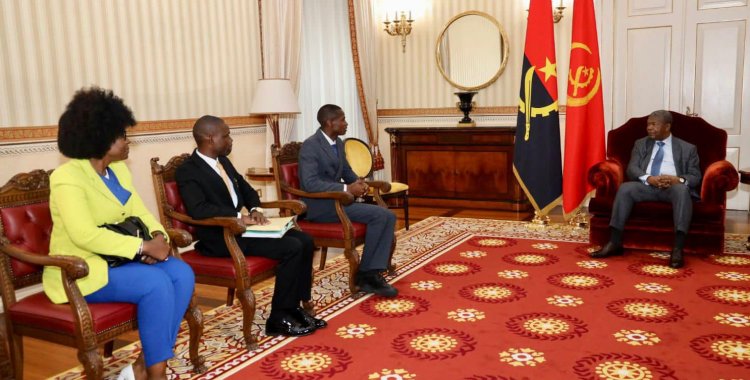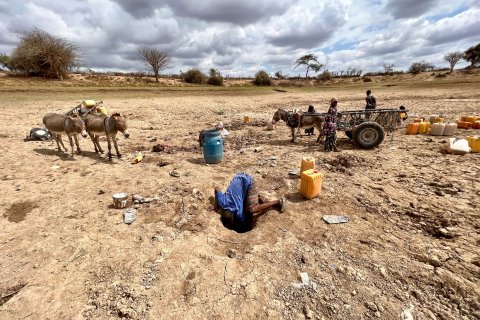According to a note from CIPRA, to which VerAngola had access, it was during the afternoon of Thursday that João Lourenço received the heads of youth associations linked to the business sector, who took the opportunity to ask for "facilities in accessing credit" and to present "proposals for the improvement of the country's economic situation" to the President.
In separate audiences, the head of state "sounded the Public Relations coordinator of the Association of Young Angolan Entrepreneurs, Cumbi Júnior, the presidents of the International Youth Forum with the Embassies, Clinton Matias, and of the Angolan Fishing, Agriculture and Salt League (LASPA), Jorge Hilário".
Speaking to the press, Cumbi Júnior made it known that he presented João Lourenço with the issue of access to finance, which in his view "has still been very difficult" for many young people, having received "words of comfort" that the Government will continue to work in order to respond to the problems of the sector.
The "president of the International Youth Forum with the Embassies said that he took advantage of the audience to present solutions that could impact the social and economic life of the population", reads the note.
On the occasion, Clinton Matias recalled that "the function of his organization is to support the implementation of public policies issued by the holder of the Executive Branch, with the support of various partners, mostly embassies, with a view to attracting investors to Angola, who may contribute to the diversification of the country's economy".
In turn, the president of the Angolan Fishing, Agriculture and Salt League expressed concern regarding "the critical state" of some fish species in Angola.
On the occasion, he said that there are several species that are in the red line and if concrete measures are not taken to recover "we could have very dark days in fishing".
"He gave as an example horse mackerel, croaker, cachucho, swordfish and sardines, previously abundant resources, but currently rare, due to the unrestrained capture, carried out mainly between 2017 and 2020", reads in the statement.
Representatives of business associations address the socioeconomic situation
Also this Thursday, the head of state received representatives of business associations. According to another CIPRA communiqué, to which VerAngola had access, "the increase in national production, the price of private education fees, credit to support female entrepreneurship and the promotion of tourism were at the heart of the concerns expressed" by the representatives to the President.
Also in separate meetings, João Lourenço met with "the presidents of the poultry farmers' associations (ANAVI), Rui Santos, of the Angolan Cement Industries (AICA), Manuel Pacavira, of Angolan Real Estate Professionals (APIMA), Cléber Correia, of the Hotels and Resorts of Angola (AHARA), Ramiro Barreira, Private Education (ANEP), António Pacavira and the Federation of Women Entrepreneurs of Angola (FEMEA), Francisca Fortes".
On the occasion, Rui Santos mentioned a "15-year production program that ANAVI has been discussing with the Angolan Government to increase production not only of eggs, already in effect, but above all of chicken and meat, a project that foresees 10 thousand tons in the first year of production", reads the note.
The official made it known that the head of state "took good note" of the concerns expressed and that "he will issue clear guidelines" to respond to the demand.
In the field of the cement industry, adds the note, the conversation focused on "stability of fuel supply to the production units, production costs, in terms of benefit for the reduction of costs and, consequently, the final price of cement and mineral resources".
On the occasion, Manuel Pacavira assured "to continue distribution to the market with national cement", especially in the province of Cabinda, in order to reduce the importation of this product from Ponta Negra, "which has a very strong market".
"As for the real estate sector, diplomas were pointed out that need to be approved by the Angolan Executive, namely the document on fiduciary alienation and other projects such as Agro Vilas, to solve the problems of ex-combatants and social leasing for citizens who do not have financial capacity", says the note.
With regard to fiduciary alienation, Cléber Correia advanced that the diploma aims to enable the "resolution of a non-compliance without the use of the court and establish direct relations between buyer and seller, causing the private agent to finance the buyer himself".
Ramiro Barreira said he received from the President "challenges in the sense of working and creating better ways and platforms to develop tourism" in the country.
Among the guidelines of the head of state, the "promotion of small businesses, such as snack bars, restaurants and tobacconists in emblematic places of tourist activity in the country" stands out.
Thus, he referred that they have "many challenges and the biggest one is" to remain "united to make Angola a country with solid and strong tourism".
In turn, the president of ANEP said he had proposed to João Lourenço the reduction of the "industrial tax from 25 to 10 percent", as well as the "opening of a credit line for the education sector".
The official said that if the Executive "accepts the requests of the academic class, the price of tuition fees may reach a balance", having also announced an update of fees for this year.
"There will not be a substantial increase, because we continue in the regime of monitored prices. In other words, the Government will maintain control of tuition fees and while this regime lasts, schools will have more or less balanced prices", he said, quoted in the statement.
Finally, Francisca Fortes "defended, among other benefits for the female class, the creation of a credit fund to support women". She also asked the head of state for "greater training and training of the female class in the areas of agribusiness, agro-industry and literacy, as well as the decentralization of the Integrated Citizen Assistance Service for communities that live in areas of difficult access", the note also reads.







